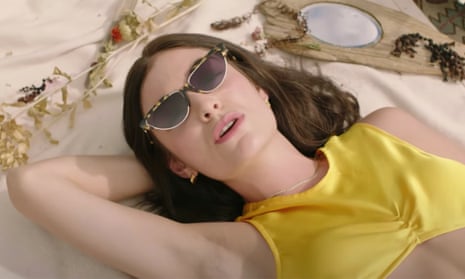Lorde has said she was “waiting for the right moment” to release her comeback single, Solar Power, and opted for 11 June to coincide with the year’s only solar eclipse (although leaks may have forced her hand). Her chosen date resonates beyond the obvious thematic associations of her hazy, sun-worshipping comeback single and its cheeky cover art.
Pop stars, especially young women, are expected to be available, relatable, always on. Lorde has defied this with an old-school release rate (just three albums in nine years) and such a low-key public presence that a recent update of her Instagram account on which she reviews onions rings generated headlines. (She benefits, too, from New Zealand’s minimal paparazzi culture.) The rare arrival of new music from the 24-year-old, last heard from in 2017, has come to feel like its own celestial event.
With Solar Power, Lorde both welcomes you into her world and revels in that distance. Produced – as was 2017’s Melodrama – by Jack Antonoff, it might be her most universal song, hippy in sound and spirit, and a world away from its nocturnal predecessors. Its loose percussive gait and acoustic simplicity evoke George Michael (both Faith and Freedom 90), Screamadelica-era Primal Scream and the Stones (Sympathy for the Devil), stirring a summer-of-love mood replete with appropriately cultish intimations (“I’m kind of like a prettier Jesus,” she sings, with knowing silliness).
She makes no apologies to curmudgeonly heat-haters, luxuriating in those days on the beach – an in-between space, and corresponding state of mind – where bodies soften and time turns to syrup. (English is no match for the French word for basking in the sun, lézarder – to be like a lizard.) Familiar and charmingly dippy, it’s an invitation to the world’s least exclusive party – the joy of feeling the sun on your face and sensing your defences melt (a particularly potent pleasure this year). Yet sung in pop’s most conspiratorial voice – that sweet, scratchy whisper – Lorde conjures its transformational magic anew.
It evolves her sensitivity as a songwriter, one obsessed with investigating the transformative forces that accompany each new phase of life: imagination on her debut, 2013’s Pure Heroine, liberating the bored teenager from her suburban, southern-hemisphere existence; drugs and recklessness on Melodrama, to exorcise heartbreak and find revelations in the highs; here simply tripping on nature and expanded horizons, an ease that only comes with age. (Each album era has made a parallel journey from the suburbs to the city to the coast.) Her affinity for giving each album era a chromatic identity leaps out too, in the “acid green, aquamarine” and “cheeks in high colour, overripe peaches”.
These are the distinctly satisfying particularities of Lorde’s songwriting that few of her imitators have been able to replicate. It’s impossible to miss how much of pop in 2021 sounds like her earlier work, from the skeletal, percussive production of Royals to the cresting vocal harmonies most conspicuous on the recent debut album by Olivia Rodrigo. There’s a little of the latter on Solar Power, but it’s otherwise a distinct reinvention, one that gleefully puts a gap between Lorde and everyone else in terms of her creativity and as an obsessed-over figure: “I throw my cellular device in the water / Can you reach me? No, you can’t,” she sings with a sly laugh (one that recalls the delicious asides in Melodrama track The Louvre).
A newsletter sent to fans announcing Solar Power’s release revelled in the knowledge that most of her fans will hear it as we head into summer, while at home in New Zealand winter is on the way, making the song its own source of apricity. The video is a who’s-who of the Ponsonby scene – imagine Bad Blood with intimidatingly cool Auckland influencers. Lyrics about being photographed by her boyfriend and leading kids to the beach to hear her secrets affirm Lorde’s admirable faith in her own magnetism. (See our 2017 interview: “I want to be Leonard Cohen. I want to be Joni. Fucking. Mitchell.”) She draws a distinct line in the sand around her territory, protecting the freedom, privacy and time that are most likely the true source of her renewable energy – precious commodities in the pop world that the industry could do better to protect.

